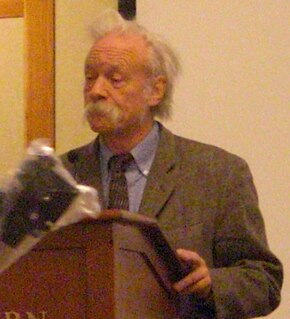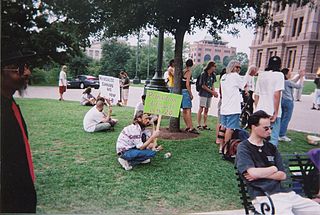Related Research Articles

Edward "Ed" Rosenthal is an American horticulturist, author, publisher, and Cannabis grower known for his advocacy for the legalization of marijuana use. He served as a columnist for High Times Magazine during the 1980s and 1990s. He was arrested in 2002 for cultivation of cannabis by federal authorities, who do not recognize the authority of states to regulate the use of medical marijuana. He was convicted in federal court, but the conviction was overturned on appeal. Rosenthal was subsequently convicted again, but was not re-sentenced, since his original sentence had been completed.
The United Food and Commercial Workers International Union (UFCW) is a labor union representing approximately 1.3 million workers in the United States and Canada in industries including retail; meatpacking, food processing and manufacturing; hospitality; agriculture; cannabis; chemical trades; security; textile, and health care. UFCW is affiliated with the Canadian Labour Congress (CLC) and the AFL-CIO; it disaffiliated from the AFL-CIO in 2005 but reaffiliated in 2013. UFCW is also affiliated to UNI Global Union and the IUF.

Marc Scott Emery is a Canadian cannabis rights activist, entrepreneur and politician. Often described as the "Prince of Pot", Emery has been a notable advocate of international cannabis policy reform, and has been active in multiple Canadian political parties at the provincial and federal levels. Emery has been jailed several times for his cannabis activism.

Irvin Dana Beal is an American social and political activist, best known for his efforts to legalize marijuana and to promote the benefits of Ibogaine as an addiction treatment. He is a long-term activist in the Youth International Party (Yippies). He founded the Yipster Times in 1972. The newspaper, which was later renamed Overthrow in 1978, ended publication in 1989.

Cannabis in Canada is legal for both recreational and medicinal purposes. Medicinal use of cannabis was legalized nationwide under conditions outlined in the Marihuana for Medical Purposes Regulations, later superseded by the Access to Cannabis for Medical Purposes Regulations, issued by Health Canada and seed, grain, and fibre production was permitted under licence by Health Canada. The federal Cannabis Act came into effect on 17 October 2018 and made Canada the second country in the world, after Uruguay, to formally legalize the cultivation, possession, acquisition and consumption of cannabis and its by-products. Canada is the first G7 and G20 nation to do so.

In the United States, the non-medical use of cannabis is legalized in 18 states and decriminalized in 13 states as of June 2021. Decriminalization refers to a policy of reduced penalties for cannabis offenses, typically involving a civil penalty for possessing small amounts, instead of criminal prosecution or the threat of arrest. In jurisdictions without penalty the policy is referred to as legalization, although the term decriminalization is sometimes used for this purpose as well.

The legal history of cannabis in the United States pertains to the regulation of cannabis for medical, recreational, and industrial purposes in the United States. Increased restrictions and labeling of cannabis as a poison began in many states from 1906 onward, and outright prohibitions began in the 1920s. By the mid-1930s cannabis was regulated as a drug in every state, including 35 states that adopted the Uniform State Narcotic Drug Act. The first national regulation was the Marihuana Tax Act of 1937.

Jodie Emery is a Canadian cannabis rights activist and politician. She is the spouse of fellow activist Marc Emery. Until the business was shut down by police, the couple were co-owners of Cannabis Culture, a business that franchised pot dispensaries, later deemed to be illegal. They had obtained the cannabis from illegal sources, according to Crown prosecutors. They are the former operators and owners of Cannabis Culture magazine and Pot TV.

The use, sale, and possession of cannabis over 0.3% THC in the United States, despite laws in many states permitting it under various circumstances, is illegal under federal law. As a Schedule I drug under the federal Controlled Substances Act of 1970, cannabis over 0.3% THC is considered to have "no accepted medical use" and have a high potential for abuse and physical or psychological dependence. Cannabis use is illegal for any reason, with the exception of FDA-approved research programs. However, individual states have enacted legislation permitting exemptions for various uses, including medical, industrial, and recreational use.

Cannabis in Oregon is legal for both medical and recreational use. In recent decades, the U.S. state of Oregon has had a number of legislative, legal, and cultural events surrounding use of cannabis. Oregon was the first state to decriminalize the possession of small amounts of cannabis, and among the first to authorize its use for medical purposes. An attempt to recriminalize possession of small amounts of cannabis was turned down by Oregon voters in 1997.
Oaksterdam University is self-recognized as the world's first cannabis college. Located in Oakland, CA, the educational facility was founded in November 2007 by medical marijuana activist Richard Lee to offer quality training for the cannabis industry, with a mission to "legitimize the business and work to change the law to make cannabis legal." Its main campus was formerly located in Downtown Oakland, Calif. On March 8, 2020, fire damaged the Oaksterdam campus at which time the brick and mortar location closed. Classes are currently held online only, both asynchronous and in real time. The university has graduated nearly 50,000 students from more than 40 countries.
Operation Bid Rig was a long-term investigation into political corruption in New Jersey conducted by the Federal Bureau of Investigation, the Internal Revenue Service, and the United States Attorney for the District of New Jersey from 2002 to 2014.

Cannabis in California has been legal for medical use since 1996, and for recreational use since late 2016. The state of California has been at the forefront of efforts to liberalize cannabis laws in the United States, beginning in 1972 with the nation's first ballot initiative attempting to legalize cannabis. Although it was unsuccessful, California would later become the first state to legalize medical cannabis with the passage of the Compassionate Use Act of 1996. In November 2016, California voters approved the Adult Use of Marijuana Act to legalize the recreational use of cannabis.

California Proposition 19 was a ballot initiative on the November 2, 2010 statewide ballot. It was defeated, with 53.5% of California voters voting "No" and 46.5% voting "Yes." If passed, it would have legalized various marijuana-related activities, allowed local governments to regulate these activities, permitted local governments to impose and collect marijuana-related fees and taxes, and authorized various criminal and civil penalties. In March 2010, it qualified to be on the November statewide ballot. The proposition required a simple majority in order to pass, and would have taken effect the day after the election. Yes on 19 was the official advocacy group for the initiative and California Public Safety Institute: No On Proposition 19 was the official opposition group.

The legal history of cannabis in the United States began with state-level prohibition in the early 20th century, with the first major federal limitations occurring in 1937. Starting with Oregon in 1973, individual states began to liberalize cannabis laws through decriminalization. In 1996, California became the first state to legalize medical cannabis, sparking a trend that spread to a majority of states by 2016. In 2012, Washington and Colorado became the first states to legalize cannabis for recreational use.

Initiative 71 was a Washington, D.C. voter-approved ballot initiative that legalized the recreational use of cannabis. The short title of the initiative was Legalization of Possession of Minimal Amounts of Marijuana for Personal Use Act of 2014. The measure was approved by 64.87% of voters on November 4, 2014 and went into full effect on February 26, 2015.

Cannabis on American Indian reservations historically largely fell under the same regulations as cannabis nationwide in the United States. However, the August 2013 issuance of the Cole Memorandum opened discussion on tribal sovereignty as pertains to cannabis legalization, which was further explored as the states of Washington and Colorado legalized marijuana. A clarifying memo in December 2014 stated that the federal government's non-interference policies that applied to the 50 states, would also apply to the 326 recognized American Indian reservations. U.S. Attorney for Oregon, Amanda Marshall, stated that the clarification had been issued in response to legal questions from tribal nations, but that only three unnamed tribes, in California, Washington state, and "the Midwest" had stated explicit interest in legalizing.

Cannabis in Wisconsin is illegal for recreational use. Possession of any amount is punished by up to 6 months in prison and a $1000 fine for a first offense. A second offense is punished as a felony with up to 3.5 years in prison and up to a $10,000 fine. Medical use is legal only in the form of low-THC cannabis oil.

Cannabis in Texas is illegal for recreational use. Possession of up to two ounces is a class B misdemeanor, punishable by a fine of up to $2,000 and/or up to 180 days in jail. Several of the state's major municipalities have enacted reforms to apply lesser penalties or limit enforcement, however.
References
- 1 2 3 4 5 6 United States District Court, Northern District of California (June 22, 2017). "06 22 17 Rush Hearing Transcript Guilty Plea". Case No. CR 15-00454 HSG. Retrieved March 29, 2020.
- ↑ "Union Organizer Indicted for Corruption, Attempted Extortion, and Money Laundering". FBI . 17 September 2015.
- 1 2 3 4 5 6 7 8 9 Jason Fagone (March 29, 2020). "Operation Limelight — How a fearsome, fast-talking union boss helped legalize pot, took kickbacks and ended up in prison" . Retrieved April 21, 2020.
- ↑ Peter Hecht (3 October 2010). "Growth of California's pot industry is good news for unions". Mcclatchydc.com.
- ↑ John Hoeffel (22 September 2010). "California's largest labor union backs pot legalization initiative". Los Angeles Times .
- ↑ Chris Harland (10 November 2015). "Will unionizing the cannabis industry bud in Oakland?". Oakland North.
- 1 2 Chris Roberts (21 July 2016). "Former Cannabis Union Honcho: Feds Took Me Out". CannabisNow.
- 1 2 David Downs (24 September 2015). "Pot Union Organizer Dan Rush Pleads Not Guilty to Corruption, Attempted Extortion, and Money Laundering". East Bay Express.
- 1 2 "Union Organizer Indicted For Corruption, Attempted Extortion, And Money Laundering". United States Department of Justice . 17 September 2015.
- ↑ Romain Bonilla (14 August 2015). "Marijuana Union Organizer Wanted by FBI on Corruption Charges". Marijuanapolitics.com.
- ↑ Ari Berman (2 September 2010). "Just Say Now". Oakland North. Archived from the original on 2017-01-04. Retrieved April 21, 2020.
- 1 2 3 "UFCW Local 5 Statement on the Indictment of Dan Rush". UFCW Local 5. 15 August 2015. Archived from the original on 2015-08-18. Retrieved April 21, 2020.
- ↑ Steve Elliott (28 May 2010). "California Medical Marijuana Workers Form Union". Tokeofthetown.com.
- ↑ "Union endorses initiative to legalize marijuana in California". Los Angeles Times . 14 July 2010.
- ↑ "After cannabis school raid, big turnout expected at S.F. protest". Los Angeles Times . 2 April 2012.
- ↑ "CCPR Board of Directors". Coalition for Cannabis Policy Reform. Archived from the original on 2017-01-04. Retrieved 2017-01-03.
- 1 2 David Downs (18 August 2015). "Indicted Pot Union Ex-Official Dan Rush Says He Will Be Vindicated". East Bay Express . Retrieved April 21, 2020.
- ↑ Laurel Bard; Maya Eliahou; Emma Soldon (24 September 2015). "Berkeley Medical Cannabis Commission member arraigned for extortion, taking bribes". The Daily Californian .